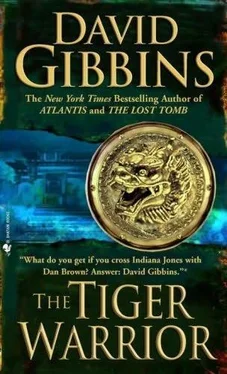David Gibbins - The Tiger warrior
Здесь есть возможность читать онлайн «David Gibbins - The Tiger warrior» весь текст электронной книги совершенно бесплатно (целиком полную версию без сокращений). В некоторых случаях можно слушать аудио, скачать через торрент в формате fb2 и присутствует краткое содержание. Жанр: Прочие приключения, на английском языке. Описание произведения, (предисловие) а так же отзывы посетителей доступны на портале библиотеки ЛибКат.
- Название:The Tiger warrior
- Автор:
- Жанр:
- Год:неизвестен
- ISBN:нет данных
- Рейтинг книги:4 / 5. Голосов: 1
-
Избранное:Добавить в избранное
- Отзывы:
-
Ваша оценка:
- 80
- 1
- 2
- 3
- 4
- 5
The Tiger warrior: краткое содержание, описание и аннотация
Предлагаем к чтению аннотацию, описание, краткое содержание или предисловие (зависит от того, что написал сам автор книги «The Tiger warrior»). Если вы не нашли необходимую информацию о книге — напишите в комментариях, мы постараемся отыскать её.
The Tiger warrior — читать онлайн бесплатно полную книгу (весь текст) целиком
Ниже представлен текст книги, разбитый по страницам. Система сохранения места последней прочитанной страницы, позволяет с удобством читать онлайн бесплатно книгу «The Tiger warrior», без необходимости каждый раз заново искать на чём Вы остановились. Поставьте закладку, и сможете в любой момент перейти на страницу, на которой закончили чтение.
Интервал:
Закладка:
“It sounds like a lunar colony,” Costas murmured.
Hiebermeyer replaced the tarpaulin and pulled up another one beside it, revealing a pile of dark stones about the size of soccer balls. “Ballast,” he said. “It’s basalt, volcanic, foreign to this area.”
“Ballast,” Costas repeated. “Why?”
“An outward-bound ship, filled with gold and wine, is going to sail along fine. A ship returning with peppercorns is going to bob around like a cork. You needed ballast. This stone’s been sourced to southern India.”
“Maurice!” Jack exclaimed, patting him on the back. “We’ll make a nautical archaeologist of you yet.”
“India,” Costas said. “Someone’s going to have to fill me in.”
Jack turned to him. “For millennia, the ancient Egyptians received goods from beyond the Red Sea, but always via middlemen. Then, after Alexander conquered Egypt and the first Greek merchants appeared along this coast, someone told the Egyptians and the Greeks how to sail across the Indian Ocean using the monsoon. They sailed out from Egypt with the northeasterly monsoon, came back with the southwesterly, achieving one round voyage a year. It was dangerous and terrifying, but the winds were as predictable as the seasons. It opened up an amazing era of maritime discovery. The first Greek sea merchants hit India soon after Berenike was established. After the Romans took over Egypt in 31 BC, everything revved up. Under Augustus as many as three hundred ships left from here annually. It was big investment, big risk stuff, just like the European East Indies trade fifteen hundred years later. Gold, silver, wine went out; gems, spices, pepper came back.”
“And not just that,” Hiebermeyer said, leaping out of the trench and wiping the sweat from his forehead. “Now for what I really wanted you to see. Follow me up the hill.” A scorching gust of wind blew up, stinging their eyes. Costas crouched back against it, then trudged up behind the other two men.
“We’ve been talking about the Battle of Carrhae, Crassus’ lost legions,” Jack said.
“I’m always ready to hear about a Roman defeat,” Hiebermeyer replied, grinning at Jack.
“Come on. The Romans didn’t rule Egypt that badly. If it wasn’t for them, you wouldn’t be here, sunning yourself beside the Red Sea. This is basically a Roman site.”
“I’d rather be in the Valley of the Kings,” Hiebermeyer sniffed.
“Talking to Costas about Carrhae set me thinking about another Roman defeat,” Jack said. “One never forgotten by the emperors. The lost legions of Varus, destroyed in AD 9 in the Teutoberg Forest.”
Hiebermeyer stopped in his tracks. “That was my first real taste of archaeology as a boy, hunting for the site of the battle. My family owned a lodge nearby, outside Osnabruck in Lower Saxony.”
Jack shaded his eyes and looked at Costas. “The Romans were pushing into Germany. It was the glory days of Augustus. The possibilities seemed limitless. Then it all went horribly wrong. Varus was inexperienced, like Crassus, and took three legions into unknown territory. They were ambushed by the Germans and annihilated, twenty thousand men at least.”
“What’s your point?” Hiebermeyer said, walking slowly again up the hill.
“The decline of Berenike, after Augustus. It’s bizarre, at the height of the empire when the Roman economy was booming. It’s as if the British government had suddenly pulled out of any interest in the East India Company in the late eighteenth century, when the biggest fortunes were being made.”
“The defeat stopped the Romans in their tracks,” Hiebermeyer said. “The Rhine became the frontier. Augustus nearly went insane over those lost legions.” Jack nodded. “I wonder if Augustus had second thoughts. He looked east, to Arabia, to India, the lands beyond this place, where everything was ripe for conquest. He looked, and he said no. The empire was big enough. They couldn’t afford another defeat. And the risk out here, the cost of failure, was huge.”
“And not just military,” Costas said.
“Go on.”
“Massive fortunes were involved, right? Shiploads of gold and silver. That means only the wealthiest investors, including the emperor himself What are the chances of shipwreck on a voyage out here, one in three, one in four? Let’s say it happens, and the emperor loses big-time. His own cash. A high-risk investment gone wrong, and then those legions wiped out. It’s all too much. He pulls the plug on India.”
Jack stopped. “That’s a hell of an idea.”
“I’ll sell you it for a cold beer,” Costas said, wiping his forehead.
“Find me a wreck out here full of mint issues of Imperial gold, and I might believe you,” Hiebermeyer said, trudging determinedly up the slope ahead of them. Costas looked questioningly at Jack, who grinned and followed Hiebermeyer.
“Speaking of shipwrecks, thanks for the hint, Maurice,” Jack said loudly, catching up.
“Huh?”
“That translation you emailed me. From the Coptos archive. The ancient shipwreck. The elephantegos. ”
“Ah. Yes.”
“We found one.”
“Ah. Good.”
“We found an elephantegos. ”
“Ah. Yes. Good.” Hiebermeyer stopped, clearly deep in some other train of thought, nodded sagely, then carried on walking. After a few moments he stopped again, dead in his tracks, and peered at Jack, his mouth open in astonishment. Jack caught Costas’ eye, and the two of them continued up the slope. Hiebermeyer followed them to the edge of another large excavation trench, where he was suddenly preoccupied by the busy scene in front of them. He gesticulated at a group of students and Egyptian workers under a tarpaulin in one corner. A dark-featured Egyptian woman quickly came over and climbed out of the trench in front of them, her hair tied back under a bush hat. She spoke quietly to Hiebermeyer in German. He nodded and turned to Jack. “You remember Aysha? She dug with me in the mummy necropolis in the Fayum. She’s in charge there now, but I got her down here as soon as we started finding what you’re about to see.”
“Congratulations on your doctorate.” Jack shook hands warmly with her.
“And on your assistant directorship of the Institute in Alexandria,” Costas said.
“Someone had to look after Maurice,” she said.
Jack smiled to himself. Two years ago Aysha had been Hiebermeyer’s top graduate student, a naturally gifted excavator who had more patience than Maurice did for the minutiae of a dig, able to spend hours dissecting a shred of mummy wrapping where Maurice would have quickly become flustered. She was never subservient to him, always quietly in control. She was his perfect foil, and he was never pompous with her. Jack looked at them together for a moment, and then banished the thought. It was impossible. Maurice would never allow the distraction.
“You must miss New York City,” Costas said. “I get back whenever I can.”
“When I finished at Columbia, I kept the apartment,” Aysha said. “When this dig’s over for the season, I’m back in NYC for a sabbatical. The apartment’s where we arranged with Rebecca’s guardians for her to meet up with Jack for the first time. They stayed there together in the spring.”
“Thanks again for that, Aysha,” Jack said, smiling at her. “You know she’s with us on Seaquest? ”
“Of course. She emailed me this morning. A running commentary on your friend’s appalling jokes.”
“When you’re back in Queens, say hello to my barber, Antonio,” Costas said wistfully. “Corner of Fourteenth and Twenty-second. For ten years he cut my hair. While I was at school. Five bucks a go. Gave me my first shave. Taught me everything I know.”
“Of course, Costas,” Aysha said, rolling her eyes. “Next time I make a hair appointment.”
Читать дальшеИнтервал:
Закладка:
Похожие книги на «The Tiger warrior»
Представляем Вашему вниманию похожие книги на «The Tiger warrior» списком для выбора. Мы отобрали схожую по названию и смыслу литературу в надежде предоставить читателям больше вариантов отыскать новые, интересные, ещё непрочитанные произведения.
Обсуждение, отзывы о книге «The Tiger warrior» и просто собственные мнения читателей. Оставьте ваши комментарии, напишите, что Вы думаете о произведении, его смысле или главных героях. Укажите что конкретно понравилось, а что нет, и почему Вы так считаете.












